
Erasmus+ Project: Empowering Civil Society Through A Learning Environment
More and more Civil Society Organizations (CSOs), and alongside social enterprises, with different goals, motivations, structure and geographical coverage are aiming at filling state gaps and addressing various, at times pressing and imminent, societal challenges. The financial and the refugee crisis have urged CSOs to develop innovative ways in order to survive and to seek alternative sources of funding (e.g. Foundations, Companies, etc.) while they have forced them to improve their services in order to meet the increasing needs (provide humanitarian aid, psycho-social and legal support, etc.) of the vulnerable and disadvantaged groups.
Therefore, non-profits had to adapt to the new challenges, improve their operations and at the same time turn their focus on issues such as their funding and sustainability. Recognizing these needs, some new actors have emerged and aimed at assisting CSOs to overcome their difficulties. These actors can be non-profit organizations, Foundations, Universities and other entities which offer services (such as capacity building, consulting, educational programs, surveys, premises etc.) to CSOs in order to help them strengthen their skills and increase their impact. These practices could have a positive impact on other non-profits from other countries by addressing common gaps. However, other non-profits do not have access to this knowledge and these practices, as there is no framework that would stimulate contacts and interactions between organizations involved in education and training of civil society. In effect, such actors work much in isolation with other relevant initiatives across Europe, leading to limited, if any, ideas and experience sharing. Without a doubt, sharing and implementing best practices have many benefits for relevant organizations. Among these benefits are better quality and increased quantity of services, improved use of resources as well as cost and time-saving. The urgency and importance of such development is reinforced by the fact that these types of initiatives can operate as impact multipliers when their operations are enhanced: through their operations more and more CSOs can be reached and supported thus creating significant added value by any exposure to best practices, not confined in the initial beneficiaries per se.
This project aims at bringing together seven (7) organizations from 6 different program countries (Greece, Cyprus, Italy, Bulgaria, Estonia, Serbia) and 1 partner country (Israel) who support civil society and are experts in a particular field (e.g. fundraising, networking, advocacy, volunteer management, social entrepreneurship, etc.) in order to identify best practices and share their experience. Furthermore, an open learning environment for all stakeholders will be created where each partner will share best practices and strategies. By having access to this environment, organizations will be able to interact and understand how other actors have dealt with similar situations and challenges and will be able to make better and informed decisions more promptly. Therefore, they will be able to improve their efficiency and implement outstanding practices. Finally, all partners, as well as their beneficiaries (civil society organizations), will have the chance to elevate their work, advance their performance and enhance their social impact.
The target group of the project will be non-profit organizations and entities operating in EU countries that empower civil society through capacity building, educational programs, and other services.
The project will last 22 months and will be implemented via the following set of actions:
– Mapping of best practices
– 3 Transnational Project Meetings
– 3 Learning/Teaching/Training Activities on the following thematic areas: Social Entrepreneurship, Impact Assessment, Nonprofit Fundraising Sources, Proposal writing, Project
management, Building financial sustainability, Creating a Business Plan, Networking, Developing an advocacy strategy.
The results expected are the following:
• Mapping of good practices, successful strategies, and methods from 7 different countries
• Exchange good practices, tools and programs tested from the organizations participating in the project
• Enhance the skills of 21 people (working in the partnering organizations) who will participate in the
three Learning/Teaching/Training Activities
• Bring together and reinforce the collaboration among the 7 partner organizations operating in different countries
• Generate innovative ideas and create new tools that could be useful for the organizations
• More than 4.000 members of civil society organizations supported by the partners will improve their skills and services
• More than 9.500 newsletter subscribers will receive the final report of the project with good practices and methods
• More than 33.100 followers on Social Media will have access to the final report
Coordinator: HIGGS
Partners:
- FONDAZIONE GIACOMO BRODOLINI S.R.L. SB – Italy
- BLACK SEA NGO NETWORK – Bulgaria
- VABAUHENDUSTE LIIT – Estonia
- SYNTHESIS CENTER FOR RESEARCH AND EDUCATION LIMITED – Cyprus
- CIVIC INITIATIVES – CITIZENS ASSOCIATION FOR DEMOCRACY AND CIVIC EDUCATION – Serbia
- MIDOT – REFLECTING AND RATING NPOS LTD. – Israel

